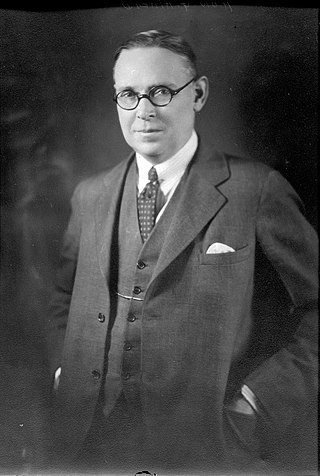
Richard Gavin "Dick" Reid was a Canadian politician who served as the sixth premier of Alberta from 1934 to 1935. He was the last member of the United Farmers of Alberta (UFA) to hold the office, and that party's defeat at the hands of the upstart Social Credit League in the 1935 election made him the shortest serving premier to that point in Alberta's history.
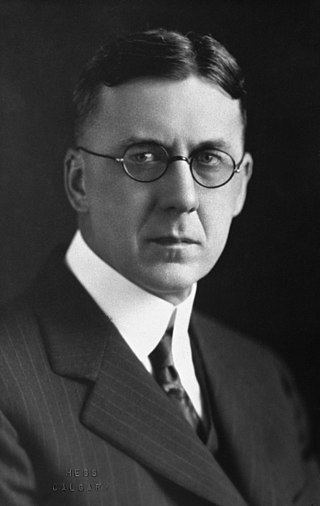
John Edward Brownlee, was the fifth premier of Alberta, serving from 1925 until 1934. Born in Port Ryerse, Ontario, he studied history and political science at the University of Toronto's Victoria College before moving west to Calgary to become a lawyer. His clients included the United Farmers of Alberta (UFA); through his connection with that lobby group, he was involved in founding the United Grain Growers (UGG).

Herbert W. Greenfield was a Canadian politician and farmer who served as the fourth premier of Alberta from 1921 until 1925. Born in Winchester, Hampshire, in England, he immigrated to Canada in his late twenties, settling first in Ontario and then in Alberta, where he farmed. He soon became involved in the United Farmers of Alberta (UFA), a farmers' lobby organization that was in the process of becoming a political party, and was elected as the organization's vice president. Greenfield did not run in the 1921 provincial election, the first provincial general election in which the UFA fielded candidates, but when the UFA won a majority in the Legislature in that election he was chosen by the UFA caucus to serve as Premier. Like most of the UFA caucus, Greenfield had no experience in government and he struggled in the position.
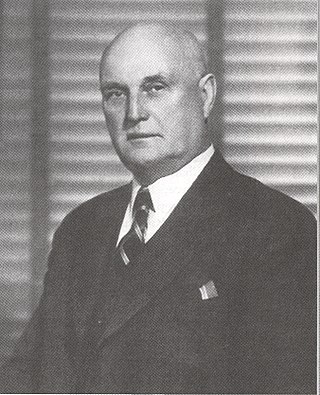
Charles Stewart, was a Canadian politician who served as the third premier of Alberta from 1917 until 1921. Born in Strabane, Ontario, in then Wentworth County, Stewart was a farmer who moved west to Alberta after his farm was destroyed by a storm. There he became active in politics and was elected to the Legislative Assembly of Alberta in the 1909 election. He served as Minister of Public Works and Minister of Municipal Affairs—the first person to hold the latter position in Alberta—in the government of Arthur Sifton. When Sifton left provincial politics in 1917 to join the federal cabinet, Stewart was named his replacement.

The United Farmers of Alberta (UFA) is an association of Alberta farmers that has served different roles in its 100-year history – as a lobby group, a successful political party, and as a farm-supply retail chain. As a political party, it formed the government of Alberta from 1921 to 1935.

The 1921 Alberta general election was held on July 18, 1921, to elect members to the 5th Alberta Legislative Assembly. It was one of only five times that Alberta has changed governments.

The 1926 Alberta general election was held on June 28, 1926, to elect members of the Legislative Assembly of Alberta. The United Farmers of Alberta government that had first been elected in 1921 was re-elected, taking a majority of the seats in the Alberta Legislature. Herbert Greenfield had resigned as United Farmers leader and premier, and John E. Brownlee led the UFA to this second election victory, increasing the UFA's number of seats.
Vegreville was a provincial electoral district in Alberta, Canada, mandated to return a single member to the Legislative Assembly of Alberta from 1909 to 1963 and again from 1971 to 1993.

The 5th Alberta Legislative Assembly was in session from February 2, 1922, to May 25, 1926, with the membership of the assembly determined by the results of the 1921 Alberta general election held on July 18, 1921. The Legislature officially resumed on February 2, 1922, and continued until the sixth session was prorogued on May 22, 1926 and dissolved on May 25, 1926, prior to the 1926 Alberta general election.
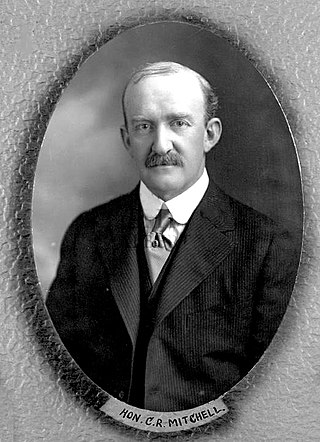
Charles Richmond Mitchell was a Canadian lawyer, judge, cabinet minister and former Leader of the Official Opposition in the Legislative Assembly of Alberta.
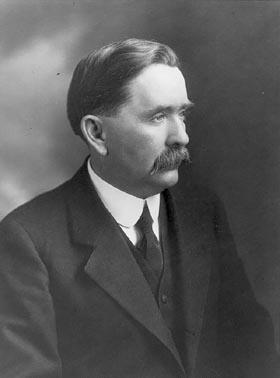
John Robert Boyle was a Canadian politician and jurist who served as a Member of the Legislative Assembly of Alberta, a cabinet minister in the Government of Alberta, and a judge on the Supreme Court of Alberta. Born in Ontario, he came west and eventually settled in Edmonton, where he practiced law. After a brief stint on Edmonton's first city council, he was elected in Alberta's inaugural provincial election as a Liberal. During the Alberta and Great Waterways Railway scandal, he was a leader of the Liberal insurgency that forced Premier Alexander Cameron Rutherford from office.

Joseph Seeley McCallum was a Canadian politician from Alberta.

Donald MacBeth Kennedy was a Canadian farmer as well as a provincial and federal level Canadian politician representing Albertans. He was a UFA MLA 1921-1922 and a Progressive/UFA MP 1921–1935.

The 7th Alberta Legislative Assembly was in session from January 29, 1931, to July 22, 1935, with the membership of the assembly determined by the results of the 1930 Alberta general election held on June 19, 1930. The Legislature officially resumed on January 29, 1931, and continued until the fifth session was prorogued on April 23, 1935 and dissolved on July 22, 1935, prior to the 1935 Alberta general election.

John Edward Brownlee was Premier of Alberta, Canada, from 1925 to 1934 as leader of the United Farmers of Alberta (UFA) caucus in the Legislative Assembly of Alberta. After a number of early successes, his popularity and his government's suffered from the hardships of the Great Depression. In 1934, he was embroiled in a sex scandal when a family friend sued him for seduction. Though Brownlee denied the events she alleged, when the jury found in her favour he announced his resignation as premier.

Vernor Winfield Smith was a politician in Alberta, Canada who served as the province's Minister of Railways and Telephones from 1921 until 1932. Born in 1864 in Prince Edward Island, he moved to British Columbia in 1883 where he worked for several railway companies as an accountant. In 1915 he moved to Camrose, Alberta to become a farmer. The same year, he married Lily Bury, with whom he would have five children.

John Farquhar Lymburn was a Canadian politician who served as Attorney-General of Alberta from 1926 until 1935. Born and educated in Scotland, he came to Canada in 1911 and practiced law in Edmonton. In 1925, John Edward Brownlee became Premier of Alberta, and sought a lawyer without partisan affiliation to succeed him as attorney-general. Lymburn accepted the position, and was elected to the Legislative Assembly of Alberta in the 1926 election. As attorney-general, Lymburn took part in negotiations between the Alberta and federal governments over natural resource rights, prepared Alberta's submission in the Persons case, and played a minor role in the sex scandal that forced Brownlee from office. In the 1935 provincial election, Lymburn and all other United Farmers of Alberta candidates were defeated, as William Aberhart led the Social Credit League to victory. Lymburn made an unsuccessful attempt to return to the legislature in 1942, and briefly returned to prominence during the Bankers' Toadies incident, before dying in 1969.

Maurice Joy Conner, sometimes spelled Maurice Joy Connor, was a Canadian politician who served as the member of the Legislative Assembly of Alberta for Warner from 1921 until 1935. Before entering politics, he was a Methodist preacher in the United States. He first sought office in the 1921 Alberta provincial election as a candidate for the United Farmers of Alberta (UFA) in Warner. He defeated Liberal incumbent Frank Leffingwell and became one of 38 UFA candidates elected as the party, which was contesting its first election, won a surprise majority government. He was re-elected in the 1926 and 1930 elections, and did not seek re-election in the 1935 election, when the UFA lost every seat and the new Social Credit League won a majority.

Edith Blanche Rogers was a Canadian politician who served as a member of the Legislative Assembly of Alberta from 1935 until 1940. Born in Nova Scotia, she came west to Alberta to accept a job as a teacher. She later moved to Calgary where she encountered evangelist William Aberhart and became a convert to his social credit economic theories. After advocating these theories across the province, she was elected in the 1935 provincial election as a candidate of Aberhart's newly formed Social Credit League.

John Edward Brownlee served as Attorney-General of the province of Alberta in western Canada from 1921 until 1926, in the United Farmers of Alberta (UFA) government of Herbert Greenfield. As Brownlee was the only lawyer in a caucus formed almost entirely of farmers, his role extended beyond the traditional expectations of an attorney-general, and ranged from providing legal advice to explaining how to write a business letter; he also became the government's de facto leader in the Legislative Assembly of Alberta.
















